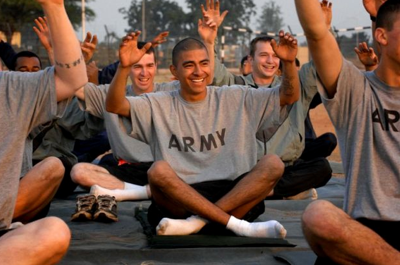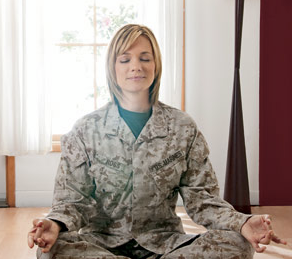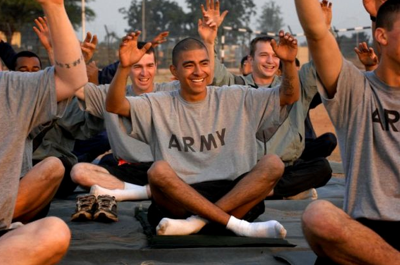Post Traumatic Stress Disorder, or PTSD, is a chronic anxiety disorder that can develop after a person is involved in a traumatic event, such as a sexual or physical assault, a natural disaster, a car accident or combat, and is increasingly common in veterans.
Reliving painful events is a common symptom of PTSD and can prove debilitating to those who suffer from it. Flashbacks, a common symptom, transport sufferers back to the moment of the original trauma and bring recurring actions and feelings of the traumatic event.
Up to 20% of veterans suffer from PTSD, and many suffer in silence.
 Operation Warrior Wellness is one of the many organizations using alternative therapies to help eliminate the symptoms of PTSD. Austin Ayer is Project Coordinator for the group, which uses Transcendental Meditation to help veterans.
Operation Warrior Wellness is one of the many organizations using alternative therapies to help eliminate the symptoms of PTSD. Austin Ayer is Project Coordinator for the group, which uses Transcendental Meditation to help veterans.
“Hopefully it will help them learn about meditation and integrate it into their own private life that nobody knows about, and can help alleviate what they’re going through,” says Ayer.
Ayer compares Transcendental Meditation to an ocean. “The active waves are on the surface and the depths have this naturally still and quiet place,” he says. “Without trying to control any of that surface activity, Transcendental Meditation allows you to naturally slip below that surface and experience those quieter, still levels of the mind.”
The goal is to resurface and maintain the experience of that stillness. The peace and tranquility, in turn, makes the mind more powerful, coherent and efficient.
“Preliminary data show that after a four week period veterans cut down their symptoms of PTSD by 50 percent,” Ayer says. He explains that the mind and body are connected and when the mind settles down, changes are visible through a patient’s EEG, breath and heart rate. And when the mind settles down, the body settles down, as well.
“The mind attains this really profound level of rest,” says Ayer, “and that really deep rest allows the body to reset itself and unweave the stress that’s been stored. Through its own innate healing mechanism, it’s a really natural way to let the body metabolize those intense experiences and stresses that have been accumulated from the traumatic stress.”
 Yoga is another way to ease the symptoms of PTSD. Yoga Warriors, based in Massachusetts, certifies yogis – or advanced practitioners – to help veterans across the United States and abroad benefit from yoga practice.
Yoga is another way to ease the symptoms of PTSD. Yoga Warriors, based in Massachusetts, certifies yogis – or advanced practitioners – to help veterans across the United States and abroad benefit from yoga practice.
Lucy Cimini, the founder of Central Mass Yoga and creator of the Yoga Warriors program, helped conduct the Iraq study, which demonstrated that hatha yoga reduces symptoms of stress and PTSD among Iraq war veterans.
Mindfulness Based Stress Reduction (MBSR) is another Massachusetts-based program that marries yoga and meditation so that “the virtues of both can be experienced simultaneously,” and alleviate symptoms of chronic disorders like PTSD. MBSR has been practiced for more than 30 years and is now used in a large number of medical centers, hospitals and clinics worldwide, including Scripps Center for Integrative Medicine and the Jefferson-Myrna Brind Center for Integrative Medicine. The goal of MBSR is to give veterans the responsibility for doing a kind of interior work that allows them to tap into their own inner resources for learning, growing, healing and transformation.
Walter Reed Army Medical Center in Washington, D.C. and the Integrative Restoration Institute (IRI) implement yoga nidra, which is a sort of “yogic nap” that uses guided meditation and visualization to allow the mind to delve beyond a normal restful state. The IRI uses iRest to help heal unresolved issues and traumas present in the body, including those developed from combat experiences. Through this practice, the mind begins to train itself and gain strength to combat anxiety, stress and chronic pain.
 As yoga and meditation become more mainstream, it seems inevitable that they are adopted by the mainstream medical community as well. This is good news for veterans.
As yoga and meditation become more mainstream, it seems inevitable that they are adopted by the mainstream medical community as well. This is good news for veterans.
What types of alternative therapies have you used to combat PTSD or everyday stress?












I think that anything that helps to focus the mind will help with PTSD, but let’s not forget that this is a severe condition that has lasting effect. I would agree that both meditation and animal therapy will certainly help though.
Hi P4P,
Hatha Yoga and meditation are especially good for PTSD. They’re also good for everyone no matter what they’re going through. They create balance and peace of mind.
Hatha Yoga is good for flexibility, strength, and relaxation. Meditation is good for peace of mind and relaxation.
To round out the workout, I also jog. I do it right before yoga and then I do meditation. It’s a good order to go in because the jogging and yoga get a person physically and mentally relaxed, which is required for getting good results by meditating.
I might also add that having a dog or a cat helps those afflicted with PTSD reconnect with something outside of themselves; it helps them get their mind off of the cause of PTSD and to feel loved and needed.
=^..^= Hairless Cat Girl =^..^=
To fight everyday stress, I use positive self-talk. I practice telling myself positive thoughts instead of entertaining negative thoughts. Plus I also take three deep breaths and count 1 to 10 before I speak whenever I encounter situations that causes me stress. Those techniques helps me calm down and control stress.
foot pain philadelphia